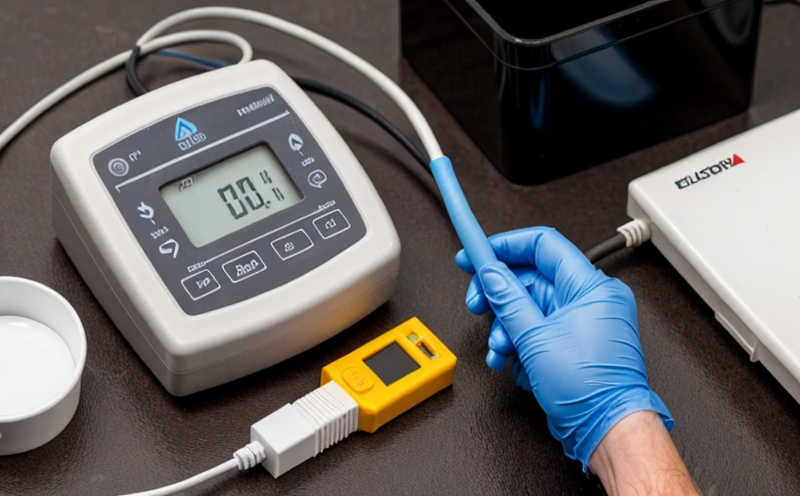ASTM D1141 Electrochemical Salt Solution Testing
The ASTM D1141 electrochemical salt solution test is a fundamental procedure used in the chemical testing sector to evaluate the resistance of materials, especially those used in corrosive environments. This method assesses the performance and durability of materials under controlled conditions that simulate real-world exposure to salt solutions. It is particularly relevant for industries dealing with coastal applications, offshore structures, and other areas where corrosion can significantly impact material integrity.
The test involves immersing specimens into a standard salt solution, typically sodium chloride (NaCl), at specific concentrations and temperatures. The specimen's resistance to electrochemical reactions is then measured using an electric current. This process allows for the determination of the material's potential for corrosion under controlled conditions, providing insights into its suitability for various environments.
The ASTM D1141 test method is widely recognized in international standards such as ISO 7253-2 and EN 10196. Compliance with these standards ensures that the testing results are reliable and comparable across different laboratories, which is crucial for quality assurance and regulatory compliance.
The procedure involves several key steps: preparation of the salt solution according to ASTM specifications, immersion of the specimen in the solution at a controlled temperature, application of an electrical current, and measurement of the resulting corrosion rate. The test duration can vary depending on the specific requirements, but it is typically conducted over 24 hours or longer.
The results of this test are critical for material selection and design optimization. Engineers and quality managers rely on these tests to ensure that materials used in corrosive environments will perform reliably under expected conditions. This testing helps prevent costly failures and extends the service life of structures, equipment, and components.
For R&D engineers, this test provides valuable data for improving material formulations and understanding the mechanisms of corrosion. The insights gained can lead to the development of more durable materials or coatings that enhance resistance to corrosive environments.
Why Choose This Test
The ASTM D1141 electrochemical salt solution test is a preferred choice for several reasons:
- Predictability of Corrosion Behavior: The controlled conditions allow for the prediction of how materials will behave in real-world corrosive environments, ensuring that selected materials are suitable for intended applications.
- International Standard Compliance: Adherence to ASTM D1141 ensures consistency and reliability in test results, which is essential for compliance with international standards such as ISO 7253-2 and EN 10196.
- Cost-Effective: By identifying materials that are prone to corrosion early in the development process, companies can avoid costly failures later on. This test helps in optimizing material selection and design, leading to cost savings.
The test is particularly beneficial for industries such as offshore oil and gas, marine engineering, and construction, where materials must withstand harsh environmental conditions. It provides a standardized approach to evaluating corrosion resistance, ensuring that the chosen materials are reliable and perform well in their intended environments.
Customer Impact and Satisfaction
- Enhanced Product Quality: By conducting ASTM D1141 tests, customers can ensure that the materials they use are resistant to corrosion, leading to higher product quality and reliability.
- Improved Compliance: Compliance with international standards like ASTM D1141 ensures that products meet regulatory requirements, thereby reducing the risk of legal issues and improving customer satisfaction.
- Increased Customer Trust: By providing consistent and reliable test results, customers gain trust in the quality and performance of materials used in their projects.
The test also contributes to long-term cost savings by preventing premature failures and extending the service life of materials. This is particularly important for industries where material longevity can have a significant impact on overall project costs.
Use Cases and Application Examples
- Offshore Oil Platforms: The ASTM D1141 test is crucial for evaluating the corrosion resistance of materials used in offshore oil platforms, ensuring that they can withstand harsh marine environments.
- Marine Structures: This test helps in selecting materials suitable for marine structures like ships and piers, which are exposed to saltwater conditions.
- Coastal Infrastructure: For infrastructure projects near the coast, ASTM D1141 testing ensures that materials used can resist corrosion caused by salty air and water.
- Construction Materials: The test is also applicable to construction materials intended for use in coastal areas or other corrosive environments.
The results of the ASTM D1141 test are used not only for material selection but also for optimizing design and manufacturing processes. By understanding the corrosion behavior of materials, engineers can make informed decisions that lead to more durable products and structures.





